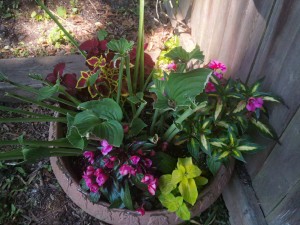
There are two kinds of guilt—guilt for things done and guilt for things left undone. Most people suffer from one or the other, or both, from time to time. Some of us, especially those who have either had mothers and/or been mothers, are masters at the art of guilt, whether we lay it on ourselves or impose it on others. Some of us multi-task and do both.
With all that guilt flying around, it is important to find spaces where guilt should be strictly forbidden. One of those spaces is the garden.
I have committed many garden sins over the years, planting vulnerable young specimens in the wrong places, over-watering, under-fertilizing, and committing small and large acts of semi-deliberate neglect, not to mention forgetting to apply deer spray at times when I knew that deer were forming a conga line in the backyard every morning at five am.
I have also failed to give the garden my best on occasion, not mulching because the bags were too heavy, not weeding because it was 90 degrees outside, not watering because it was too much trouble to uncoil the hose, and ignoring the Japanese beetles hosting daily orgies in my roses.
Every single one of those garden infractions made me feel guilty in greater or lesser degrees. After all, the net result of most of them was that plants—many of which are very desirable and a few of which were relatively expensive—suffered. More than a few died, leaving leafless corpses to bear solemn witness to my horticultural sins.
For years I wallowed in guilt over my deficiencies. Then, a few years ago, I decided that I would put it behind me. Shedding guilt has lightened my psychic load and made me a better gardener.
Guilt never saved a plant, killed an aphid or scared away a groundhog. It always takes up time and energy that would be better spent doing creative things in the garden. Guilt is much more about self-flagellation than motivation. The world gives all of us enough of the former and not enough of the latter.
I love roses, but inevitably some of them die. Sometimes this is because they were already afflicted with rose disease when they were purchased. Disease does not always manifest itself in the first year, but causes the plant to decline thereafter. But even perfectly healthy roses sometimes die, because they were planted in the wrong place, couldn’t outcompete their neighbors or were neglected by the gardener.
Whatever the reason, the best remedy for a dead rose is a moment of regret and twenty minutes of serious digging to get the plant out of the ground, followed by a trip to the garden center or a wallow in the pages of a garden catalog to find a replacement plant. Guilt over the dead rose would only bog down that process.
Deer, groundhogs, squirrels, rabbits and other garden varmints do not care how guilty—or even angry—you feel about failing to deter them. Instead of feeling guilty, vent whatever anger you have on a mound of bread dough or a messy closet, and use your ingenuity to decide what to do next. In the time it takes to luxuriate in guilt, you could order some critter-proof plants, like foxgloves in ten different shades, or a stand of gorgeous blue monkshood. If you find yourself overburdened with cash, you could make plans to build a walled or thoroughly fenced garden that would be off limits to varmints. Those solutions cost money, but they don’t extract nearly the psychic toll of guilt.
What about all that neglected watering, weeding and mulching? Guilt feeds procrastination, not motivation. Remedy past omissions by thinking realistically about what you can and can’t do and finding garden solutions that fit your personal parameters. Putting down mulch makes for less weeding. Watering means fewer struggling plants. Instead of feeling guilty and procrastinating for another season, think of future garden activities in terms of their potential for return on investment of time, energy and money.
Guilt has never made a great garden, but it has caused an awful lot of recurring headaches. This spring, shed that pain and regain the joy of gardening.
